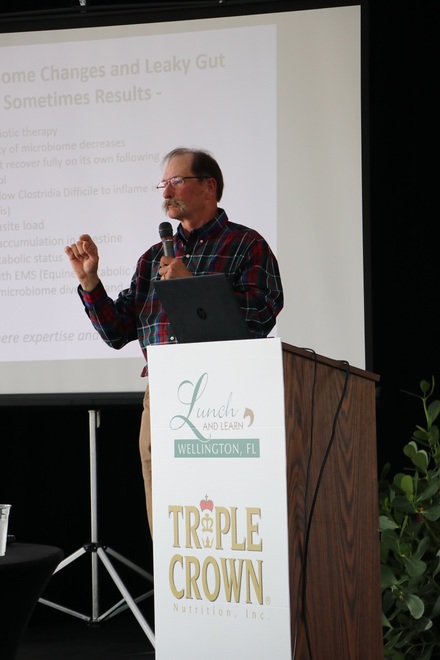“A horse is not a horse. A horse is a fermentation vat on four legs with an attitude,” said Dr. Bill Vandergrift, Ph.D., at the start of the Triple Crown Nutrition Lunch & Learn presented during Week 4 of the Winter Equestrian Festival in Wellington, Florida.

Presenting info about horse nutrition
A horse is a fermentation vat on four legs with an attitude,” said Dr. Bill Vandergrift, Ph.D., at the start of the Triple Crown Nutrition Lunch and Learn.
© 2018 by Social Circuit
The animal nutrition expert presented, ‘Gut Instincts: Feeding for Health & Performance,’ which drew a large audience and spurred a dynamic question-and-answer session after demonstrating how communication between various parts of a horse’s body plays an integral role in its overall digestive health.
He also introduced new research findings related to leaky gut syndrome, insulin resistance (IR) and equine metabolic syndrome (EMS), antibiotic therapy, and the efficacy of pre- and probiotics on the equine microbiome.
“There is now evidence to indicate that one of the causes of insulin resistance in horses is leaky gut. So, if you can fix the leaky gut, you can reduce the severity of insulin resistance,” he said. Leaky gut syndrome occurs when the tight, protective junctions between enterocytes of the intestine are compromised, breaching the ‘blood/brain barrier’ and leading to intestinal and behavioral disorders.
“The digestive system communicates with the other organs. It’s a ‘Bluetooth connection,’ so to speak,” he said, adding how an estimated one quadrillion digestive bacteria, representing more than 500 different species, populate “every inch of a horse’s gastrointestinal tract, from its mouth to its rectum,” so choosing the right diet to support intestinal health is vital.
“Stress is the number one stimulator of leaky gut and intestinal inflammation problems,” he noted. “There’s a definite relationship between leaky gut and systemic allergies, like hives.” Environment (sand versus soil), parasite loads, metabolic status, and intensity and frequency of exercise also impact the healthy and diversity of a horse’s microbiome health.
“We’ve observed that insulin resistant horses demonstrate a reduction in that diversity.” Referring again to the gut/brain relationship that can exacerbate leaky gut syndrome, he advised the use of calming agents.
“My go-to feed for treating intestinal inflammation is Triple Crown Senior, because it’s a beet pulp-based feed and when you feed beet pulp, it ferments in the hind gut and produces organic acids which act as food for intestinal cells, helping the intestine regenerate faster. Also, it’s low starch and low sugar. With intestinal inflammation, you don’t want a lot of sweet feed.”
Dr. Vandergrift earned his PhD in animal nutrition from Texas A&M University, formulated the Triple Crown feed line over 25 years ago, and is founder of EquiVision, Inc., in Versailles, Kentucky, where he has helped equine athletes thrive for more than 20 years. “It’s no secret that most performance horses don’t have the opportunity to roam and graze as nature intended. Despite these limitations, there are measures that can be taken in feeding and care regimens that can reduce negative side effects.”
Triple Crown Nutrition is Official Feed Sponsor of the US Dressage, US Eventing, and US Show Jumping Teams, and is proud to present its Lunch and Learn Series with top experts from the fields of equine nutrition and performance, weekly at the Winter Equestrian Festival. Triple Crown uses only the best grains and ingredients in its unique EquiMix® Technology. Find a dealer near you at www.triplecrownfeed.com, info@triplecrownfeed.com or toll-free (800) 451-9916.
